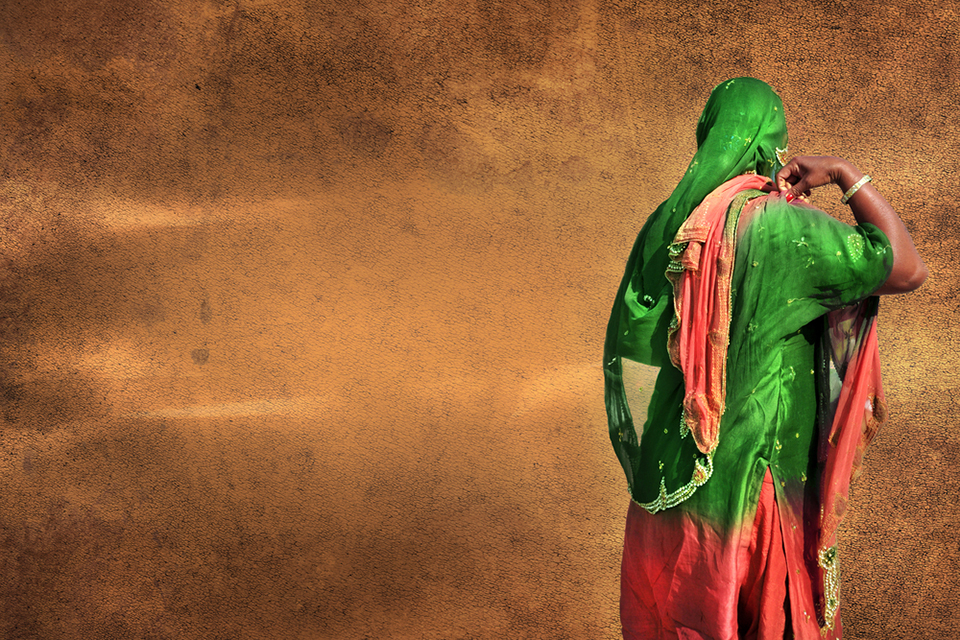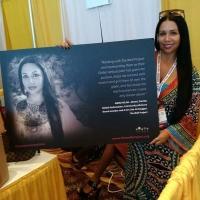
Lea esta hoja informativa en español
Table of Contents
- What Are Stigma and Discrimination?
- Why Does HIV-Related Stigma Exist?
- Stigma's Harmful Effects
- Criminalization of HIV
- Triumphing Over Stigma and Discrimination
Throughout the HIV epidemic, stigma and discrimination have had an enormous impact on women and girls. Yet, despite its devastating effects, stigma often is at the bottom of the priority list in HIV programming.
As Michel Sidibé, former Executive Director of UNAIDS, once said:
"Whenever AIDS has won, stigma, shame, distrust, discrimination and apathy was on its side. Every time AIDS has been defeated, it has been because of trust, openness, dialogue between individuals and communities, family support, human solidarity, and the human perseverance to find new paths and solutions."
What Are Stigma and Discrimination?
Stigma is an attitude or belief about a person or group of people that discredits or shames them. It highlights a "difference" between people that is viewed as negative and uses that difference as a label (e.g., HIV+) to separate people into "us" (good) and "them" (bad). This categorizing is ultimately a social or cultural experience intended to make the stigmatized seem "less than" and reduce their power.
Discrimination refers to the acts taken as a result of stigmatizing beliefs. If a woman's mother-in-law thinks that she is "dirty" or "unclean" because she is living with HIV, the woman living with HIV faces stigma in her household. If her mother-in-law refuses to allow her in the kitchen or makes her use separate dishes and utensils because of this, then the woman living with HIV is facing discrimination as well.
Both stigma and discrimination can be complicated experiences that happen at different levels and in different forms. They can happen between individuals (as in the example above), or they can happen at a broader, social level (e.g., when a whole community rejects or "turns out" a member who is living with HIV). They can be visible and obvious (e.g., when a person living with HIV is refused health services), or they can be more indirect (e.g., a healthcare provider using unnecessary precautions when treating a person living with HIV).
Everyday hidden slights and insults that communicate stigmatizing messages are sometimes referred to as microaggressions. Like other forms of stigma, microaggressions can be directed at groups based on their sex, HIV status, sexual orientation, gender identity, race, or ethnicity. For more information, see our fact sheets on Why Race Matters: Women and HIV and Women of Transgender Experience Living with HIV.
People living with HIV can also hold negative beliefs about HIV and stigmatize themselves. This is called self-stigma, or internalized stigma. For many women living with HIV, the stories we tell ourselves have more negative consequences than stigma from the outside.
"A couple of months ago I was asked if I would be interested in being interviewed and photographed as a woman living with HIV. I thought it through and decided that I would do it as an important step in my acceptance of this disease and my moving forward in shattering the stigma that surrounds me and others living with HIV… Right now, or before right now, I have felt isolated, alone, ashamed, stigmatized. The worst part of that is that I have stigmatized myself. I had decided that I was less than. Not worthy of a great and long life. Not worthy of health and happiness and love and success… I can't even begin to tell you how at peace I felt when [the photographer] left. I know it will be a fleeting feeling. But just that I felt it, if only for a few hours was enough for now. I truly felt for the first time in a long time that I am very special, valuable and worthy." – Lynn2011, from "A Step in the Right Direction" on The Well Project's A Girl Like Me blog
Why Does HIV-Related Stigma Exist?
There are many factors that contribute to stigma and discrimination against people living with HIV. Most of these factors reflect people's ignorance of the basic facts about HIV and the fears that they have about people living with HIV as a result. For example, myths about how HIV is spread can cause people to be afraid to hug someone with HIV or refuse to use the toilet after a person living with HIV has used it. Since there is currently no cure for HIV and untreated HIV can be life-threatening, people's fears can sometimes be quite strong.
"I remember shutting down when I first found out. I was ignoring everything but work. At the time I was working two jobs, so every day I went to both jobs, came home, went in my room, and shut out the world. Some days I wouldn't even eat and that wasn't good for me or healthy, being that's also when I found out I was pregnant, which also sucked because my hormones were already off balance, and now I had to deal with being HIV Positive. ‘Who is going to love me after this? Are people even going to want to be around me, want to touch me? I am going to be a real-life alien living on the planet earth'... is how I felt." – Destiny Smith, from "You, Me, We Are Not Alone" on The Well Project's A Girl Like Me blog
Most people living with HIV acquired it through sexual contact or injecting drugs. These activities are often already stigmatized in society and can come with pre-existing unfair judgments. For example, in some cultures, HIV is seen as a "punishment" for immoral or bad behavior (whether or not a woman engaged in whatever activity she was accused of doing). In many countries, a code of silence about sexual relations combined with social acceptance of men's sexual activity outside of marriage has resulted in the transmission of HIV to many women who were having sex only with their husbands. As HIV treatment advocate and educator Heidi Nass points out:
"People who get HIV aren't doing anything differently than most people they know. The only thing that separates you from all the women who've had sexual intercourse with a man or shared a needle but didn't get HIV, is that you got HIV." – from "An Open Letter: Woman to Woman" (Positively Aware, via TheBody.com)
Stigma's Harmful Effects
We have known for quite some time – through stories and studies – that stigma and discrimination can have horribly damaging effects on the health of women and girls. These effects occur both for women and girls vulnerable to acquiring HIV and those already living with it. Across the globe, the lives of women and girls are shaped by a number of gender-based inequalities – social (e.g., less power in sexual decision-making), economic (e.g., less power to earn or control income), and political (e.g., policies that deny women inheritance, education, or reproductive rights). As a result, HIV-related stigma has an even greater negative effect on women and girls.
Studies in China have shown that people who have more stigmatizing beliefs about HIV are more likely to engage in behaviors that render them vulnerable to acquiring HIV. In South Africa and France, studies have shown that people living with HIV who experienced stigma or discrimination were less likely to disclose their HIV status to their sexual partners, more likely to engage in sexual activities with higher likelihood of transmitting HIV, and therefore more likely to transmit HIV to their partners. Even in prevention studies such as the VOICE trial in South Africa, stigma was a key reason why young women did not use vaginal gels or pills to avoid acquiring HIV. Women were afraid that their use of these prevention products would cause them to be mistakenly identified as living with HIV, which would then lead to isolation and discrimination.
Stigma against HIV is a documented barrier to testing and treatment at all points along the HIV care continuum. Studies have shown that stigmatizing beliefs and/or fear of stigma keep people from getting tested for HIV, getting linked to or having access to care, staying in care, getting HIV drugs, and taking their HIV drugs correctly (adherence).
The negative effects of stigma and discrimination show up in many parts of life. They can show up in the workplace (not getting hired because of your HIV status, or a woman living with HIV not applying for a job because of her status), in travel (certain countries do not allow people living with HIV to enter), in housing (being denied housing or not feeling welcome in a neighborhood because of your HIV status), in relationships (domestic or intimate partner violence), and in healthcare (denied access, being blamed for living with HIV).
Important: If you are feeling threatened right now, call 911 or the National Domestic Violence hotline in the US at 800-799-SAFE [1-800-799-7233; or 1-800-787-3224 (TTY)], or text START to 88788. You can also search for a safe space online at Domestic Shelters.
Perhaps the most devastating effects of stigma and discrimination for women are those that come from social rejection and exclusion. Women and girls often fear stigma and rejection from their families not only because they stand to lose their social place of belonging, but also because they could lose their housing, their children, and their ability to survive. The isolation that social rejection brings can lead to low self-esteem, depression, and even thoughts or acts of suicide.
Important: If you are thinking of hurting yourself or committing suicide, please tell someone immediately. In the US, you can call or text 988, or call 1-800-SUICIDE (1-800-784-2433) or 1-800-273-TALK (1-800-273-8255). To find a suicide hotline near you, try http://www.suicide.org/suicide-hotlines.html; this website lists US hotlines by state as well as hotlines by country (click on the "International Hotlines" link at the top of the main page).
"[G]iven the Indian conservative and orthodox values, stigma, discrimination and ostracism are the potential risk factors we face. The fear of being outcasted by the society we live in is the main cause of the silence amongst PLWHA. But somewhere the walls have to be broken. Someone has to break it… Rejection brings in depression that, at times, can turn suicidal for some. It really takes lot of guts and courage to stand up on your own and fight. To battle all those negative vibes. To overcome frustrations. To be brave enough to say 'YES, I AM. SO WHAT?'" – JoDha, from "Yes, I am. So What????!!!!" on The Well Project's A Girl Like Me blog
The International Center for Research on Women (ICRW) reports that in Bangladesh more than half of women living with HIV have experienced stigma from a friend or neighbor and one in five feel suicidal. In the Dominican Republic, six out of ten women living with HIV fear being the subject of gossip, while in Ethiopia, more than half of all women living with HIV report having low self-esteem.
"Instead of writing to HIV, I found myself writing to my self-esteem. I was frightened of HIV and what it would do to me, but I knew in that honest moment that if I was to focus on how I wanted to live with this instead of how I would die of it, a virus was not the most troublesome truth I had to confront." – Heidi M. Nass, from "An Open Letter: Woman to Woman"
Criminalization of HIV
Many countries' current laws and policies increase the stigma against people living with HIV or certain groups vulnerable to HIV (e.g., people who inject drugs or people who work in commercial sex trades). A 2019 report showed that the three countries with the highest number of legal cases unfairly punishing people because of their HIV status in recent years were Russia, Belarus, and the United States.
Laws that make it illegal to engage in activities that are legal for people who are not living with HIV reinforce social attitudes that people living with HIV are "bad" and deserve to be punished. In addition, people avoid testing for HIV or disclosing their status to sexual partners for fear of prosecution. Laws that make it illegal to transmit HIV to others are also more likely to affect women and girls, since they are more likely to learn their status through prenatal testing during pregnancy. The good news is that there are now projects, movements, and organizations that are coming together to change these laws. For more information, please see our fact sheet on HIV Criminalization and Women.
Triumphing Over Stigma and Discrimination
Although HIV-related stigma and discrimination are pervasive and harmful, there are many women living with HIV who have triumphed in the face of them.
"Stigma had wreaked so much havoc in my life that I could not breathe. Every step I took to piece my life back together, stigma would be waiting. The fear of being alone and unloved was something I could not bear … I would live for years without saying a word. As time went by, I moved into a supportive housing complex with people like me. I began to learn through them, how to really come to terms with my diagnosis. I saw life and laughter and although there were some who lost everything, they were still happy. It became contagious. I wanted that kind of life. However, it would entail the sharing of my story. So one day I did just that at an event where I would share to hundreds of bike riders. For the first time in my life, I felt peace and freedom. I received love, hugs and well wishes from people who were not afraid to touch me. It moved me to continue to share my story until this very day." – msplusamerica2011, from "Why Even Share?" on The Well Project's A Girl Like Me blog
While not every woman living with HIV chooses to tell her story publicly, each woman can work on the story she tells herself. What you tell yourself about yourself – why you are living with HIV, how sexy or desirable you are, how deserving you are of health and happiness – is under your control. As Maria Mejia explains:
"I was told by someone that made a comment on my pic[ture] and my personal Facebook profile … that although they admired my work and spirit, I shouldn't make HIV so ‘Fashionista.’ He went on to tell me that HIV/AIDS is something very serious and a matter of life and death… Does this person really expect us to be all down on ourselves with an 'oh poor me' attitude? NO! I do not choose to live this way!! Please, be the happiest you can be! You can live with HIV or any other trial or struggle and still make the best out of a negative situation!" –Maria T Mejia, from "HIV Does Not Define Me" on The Well Project's A Girl Like Me blog
"Many write me from all over the world with the same question…How can I be so open about having HIV? How did I get the courage to be so open?? How can they get to where I am?? My response is always the same: I have NO SHAME! There is nothing wrong with having HIV! This is a condition like any other, we have much STIGMA around this condition because of sex! But guess what, WE ARE ALL SEXUAL BEINGS… Have self-love and know that you're not less than because of HIV!" – Maria T Mejia, from "Why Am I So Open About Having HIV?" on The Well Project's A Girl Like Me blog
If you struggle with stigma and discrimination, depression, or isolation, it can be helpful to connect with others and get support. In a past survey by The Well Project, participants said that engaging with our online resources helped them feel less isolated, decreased their self-stigma and increased their self-esteem. You can visit our online blog, A Girl Like Me, where many women living with HIV share their stories and break the silence that strengthens stigma.
To find an HIV-related support group in your area of the US, try calling your state's hotline from this list.






